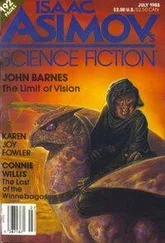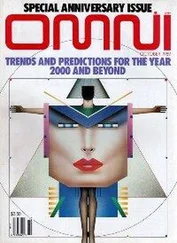She was right. There was even the same drawing of the fallopian tubes I remembered from my middle-school movie, a drawing that had always reminded me of Alien in the early stages.
“Oh, yuck,” Twidge said. “This is disgusting.”
“Do your math,” Karen said.
Bysshe looked sick. “Did women really do this stuff?”
The wine arrived, and I poured everyone a large glass. The docent pursed her lips disapprovingly and shook her head. “The Cyclists do not use the artificial stimulants or hormones that the male patriarchy has forced on women to render them docile and subservient.”
“How long do you menstruate?” Twidge asked.
“Forever,” Mother said.
“Four to six days,” the docent said. “It’s there in the booklet.”
“No, I mean, your whole life or what?”
“A woman has her menarche at twelve years old on the average and ceases menstruating at age fifty-five.”
“I had my first period at eleven,” the waitress said, setting a bouquet down in front of me. “At school.”
“I had my last one on the day the FDA approved ammenerol,” Mother said.
“Three hundred and sixty-five divided by twenty-eight,” Twidge said, writing on her slate. “Times forty-three years,” She looked up. “That’s five hundred and fifty-nine periods.”
“That can’t be right,” Mother said, taking the slate away from her. “It’s at least five thousand.”
“And they all start on the day you leave on a trip,” Viola said.
“Or get married,” the waitress said.
Mother began writing on the slate. I took advantage of the ceasefire to pour everyone some more dandelion wine.
Mother looked up from the slate. “Do you realize with a period of five days, you’d be menstruating for nearly three thousand days? That’s over eight solid years.”
“And in between there’s PMS,” the waitress said, delivering flowers.
“What’s PMS?” Twidge asked.
“Premenstrual syndrome was the name the male medical establishment fabricated for the natural variation in hormonal levels that signal the onset of menstruation,” the docent said. “This mild and entirely normal fluctuation was exaggerated by men into a debility.” She looked at Karen for confirmation.
“I used to cut my hair,” Karen said.
The docent looked uneasy.
“Once I chopped off one whole side,” Karen went on. “Bob had to hide the scissors every month. And the car keys. I’d start to cry every time I hit a red light.”
“Did you swell up?” Mother asked, pouring Karen another glass of dandelion wine.
She nodded. “I looked just like Orson Welles.”
“Who’s Orson Welles?” Twidge asked.
“Your comments reflect the self-loathing thrust on you by the patriarchy,” the docent said. “Men have brainwashed women into thinking menstruation is evil and unclean. Women even called their menses ‘the curse’ because they accepted men’s judgment.”
“I called it the curse because I thought a witch must have laid a curse on me,” Viola said. “Like in ‘Sleeping Beauty.’”
Everyone looked at her.
“Well, I did,” she said. “It was the only reason I could think of for such an awful thing happening to me.” She handed the folder back to the docent. “It still is.”
“I think you were awfully brave,” Bysshe said to Viola, “going off the ammenerol to have Twidge.”
“It was awful,” Viola said. “You can’t imagine.”
Mother sighed. “When I got my period, I asked my mother if Annette had it, too.”
“Who’s Annette?” Twidge said.
“A Mouseketeer,” Mother said and added, at Twidge’s uncomprehending look. “On TV.”
“High-res,” Viola said.
“ The Mickey Mouse Club ,” Mother said.
“There was a high-rezzer called The Mickey Mouse Club ?” Twidge said incredulously.
“They were days of dark oppression in many ways,” I said.
Mother glared at me. “Annette was every young girl’s ideal,” she said to Twidge. “Her hair was curly, she had actual breasts, her pleated skirt was always pressed, and I could not imagine that she could have anything so messy and undignified. Mr. Disney would never have allowed it. And if Annette didn’t have one, I wasn’t going to have one, either. So I asked my mother—”
“What did she say?” Twidge cut in.
“She said every woman had periods,” Mother said. “So I asked her, ‘Even the Queen of England?’ And she said, ‘Even the Queen.’”
“Really?” Twidge said. “But she’s so old!”
“She isn’t having it now,” the docent said irritatedly. “I told you, menopause occurs at age fifty-five.”
“And then you have hot flashes,” Karen said, “and osteoporosis and so much hair on your upper lip you look like Mark Twain.”
“Who’s—?” Twidge asked.
“You are simply reiterating negative male propaganda,” the docent interrupted, looking very red in the face.
“You know what I’ve always wondered?” Karen said, leaning conspiratorially close to Mother. “If Maggie Thatcher’s menopause was responsible for the Falklands War.”
“Who’s Maggie Thatcher?” Twidge asked.
The docent, who was now as red in the face as the scarf on her arm, stood up. “It is clear there is no point in trying to talk to you. You’ve all been completely brainwashed by the male patriarchy.” She began grabbing up her folders. “You’re blind, all of you! You don’t even see that you’re victims of a male conspiracy to deprive you of your biological identity, of your very womanhood. The Liberation wasn’t a liberation at all. It was only another kind of slavery!”
“Even if that were true,” I said, “even if it had been a conspiracy to bring us under male domination, it would have been worth it.”
“She’s right, you know,” Karen said to Mother. “Traci’s absolutely right. There are some things worth giving up anything for, even your freedom, and getting rid of your period is definitely one of them.”
“Victims!” the docent shouted. “You’ve been stripped of your femininity, and you don’t even care!” She stomped out, destroying several squash and a row of gladiolas in the process.
“You know what I hated most before the Liberation?” Karen said, pouring the last of the dandelion wine into her glass. “Sanitary belts.”
“And those cardboard tampon applicators,” Mother said.
“I’m never going to join the Cyclists,” Twidge said.
“Good,” I said.
“Can I have dessert?”
I called the waitress over, and Twidge ordered sugared violets.
“Anyone else want dessert?” the waitress asked. “Or more primrose wine?”
“I think it’s wonderful the way you’re trying to help your sister,” Bysshe said, leaning close to Viola.
“And those Modess ads,” Mother said. “You remember, with those glamorous women in satin brocade evening dresses and long white gloves, and below the picture was written, ‘Modess, because …’ I thought Modess was a perfume.”
Karen giggled. “I thought it was a brand of champagne !”
“I don’t think we’d better have any more wine,” I said.
The phone started singing the minute I got to my chambers the next morning, the universal ring.
“Karen went back to Iraq, didn’t she?” I asked Bysshe.
“Yeah,” he said. “Viola said there was some snag over whether to put Disneyland on the West Bank or not.”
“When did Viola call?”
Bysshe looked sheepish. “I had breakfast with her and Twidge this morning.”
Читать дальше













